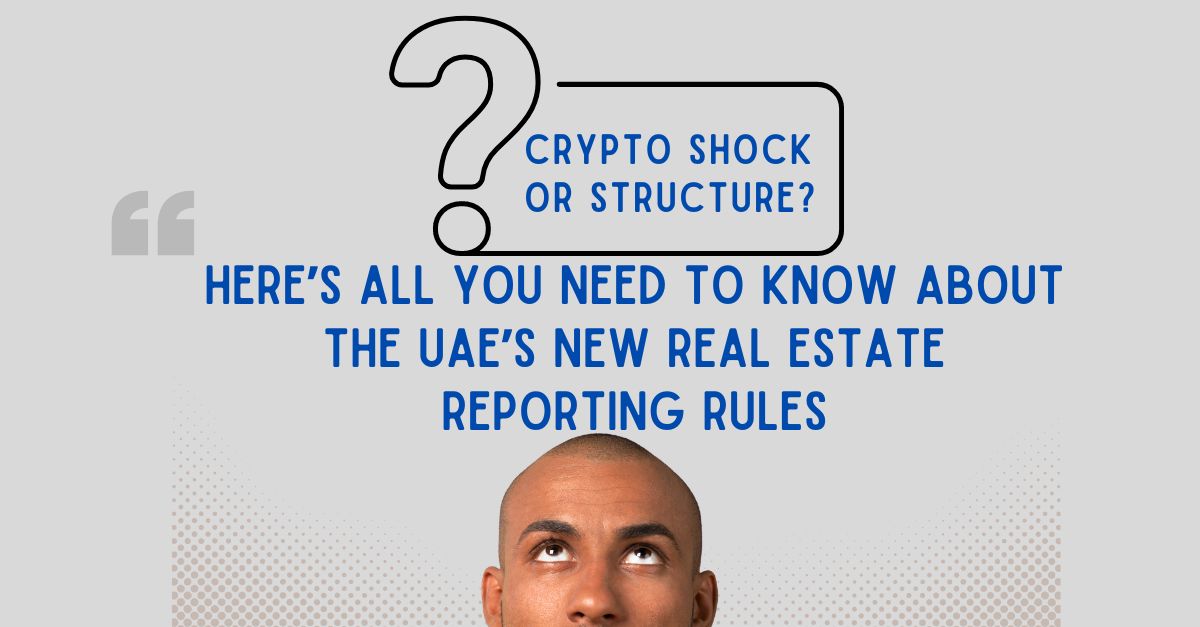Crypto shock or structure? Here’s all you need to know about the UAE’s new real estate reporting rules
Recently, following widespread sanctions on Russian assets due to the Ukraine conflict, there was a news cycle on the link between crypto and UAE real estate — how Russians hoping to hedge their crypto investments are purchasing local properties. Many reputable organizations weighed in on the development, with some stating that it reflects vulnerabilities in the real estate sector in terms of money laundering risks, etc. Dispelling such misgivings, the UAE government has announced new reporting rules for crypto and virtual assets payments in real estate transactions.
Naturally, the news cycle following the announcement is rife with speculations on the rules’ probable effect on the UAE real estate sector, which has registered a record AED 150 billion investments in the first half of 2022. Crypto vanguards, too, have pitched in, speculating how the new regulation will impact the allure of the burgeoning virtual currency market valued at a whopping $1.8 trillion. There is no denying that the new rules will have a knock-on impact on short-term sales. But how will it pan out over the long haul? What is Dubai hoping to prove with the regulations?
Setting the record straight
Seemingly, in response to the press surrounding the influx of crypto-related investments into the real estate sector, the UAE has cleared the air through new rules. For starters, it is important to note that these rules do not ban payments through crypto or virtual currencies but seek more information on the same. In doing so, the UAE has become one of the first countries in the world to regulate virtual currency transactions in the real estate sector. The additional information will help the regulator Financial Intelligence Unit (FIU) improve its data quality and accurately report to intergovernmental organizations such as the Financial Action Task Force (FATF). So, the new rules are the UAE’s way of setting the right precedents in the global crackdown against money laundering and terror financing.
Making broad-based decisions
While the FIU held the chief agency in the decision-making, the Ministry of Economy (MoE), the Ministry of Justice (MoJ), Anti-money Laundering (AML), and Countering the Financing of Terrorism (CFT), too, were consulted in the process. This reflects the forethought behind the formulation of the ruleset. The involvement of multiple apex bodies ensures that any new policy is not at odds with the interests of a certain ministry or the sector, which, in this case, is real estate. In other words, the UAE has ensured that the reporting rule will not hamper property sales and sectoral growth.
Implications for the real estate sector
By mandating more reporting, the UAE is essentially increasing transparency in transactions. The move is intended to distance the nation from those that offer “financial secrecy” to investors. Such nations often tend to feature high on the watchlist of FATF and the like. As crypto and virtual currencies continue to be met with scepticism from global decision-makers, the move to regulate their flows is understandable.
Although the UAE has been more receptive to virtual currencies, blockchain, NFTs, and the metaverse, it has established frameworks to deter fraudulent activities. The Dubai Blockchain Strategy, which saw the government fully digitize its services and operations; the recently launched Dubai Metaverse Strategy; and the Dubai Virtual Asset Regulatory Authority (VARA) are good cases in point.
Discerning investors and developing nations that subscribe to the rules-based order are increasingly favouring greater transparency over secrecy. So, it is important that the real estate sector — which contributes over 5.5% to the national GDP — characterizes utmost transparency. In the last decade, the UAE has launched several initiatives aimed at enhancing transparency in the real estate sector. The DLD registration of brokers, government-operated escrow accounts for JOPs, official price indices, etc. have been instrumental to this effect. Such efforts can impact short-term sales but facilitate structural growth in the long term. Short-lived tailwinds, such as the crypto influx due to geopolitics, pale in comparison to the growth that transparency-driven initiatives can bring.




